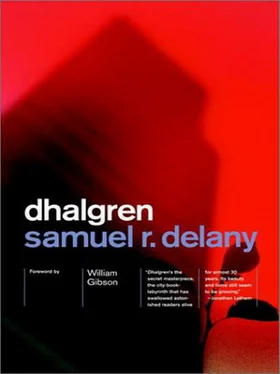"Where did you park them?"
"With the commune, mostly."
I lay back down. "They would have been better off here."
"Mmm," she agreed. "Rose went with a woman who's been keeping three girls for a couple of weeks. Everybody was pretty nice about it." Her fingers moved. "But you should have kept them."
I rolled over on my back.
Her hand dragged around my stomach.
"I didn't want them."
"Maybe somebody else around herein the nest would have. Everybody liked them… I wanted them."
"You don't live here," I said. "Except five days out of a week. And you've got them: in school."
"Yeah," she said. "Five days out of a week. But you have a point." She took her hand away. "Tell me, how do you do it?"
I asked: "What?"
"How do you — well, I was Just thinking about the article."
"Have you heard people talking about my article?".
"…yours?" That her smile held less mocking than it might was how I knew she mocked.
"About me. You know what I mean."
"Funny…" She drew her feet up cross-legged / wrinkling/ onthe blanket; "Last night at the bar people were talking about you — as usual. But they didn't spend too much time on the kids' rescue. It jars with your image, I think."
I thought about that
She explained: "It isn't two-sided enough for you. It's just straight heroics."
I heard Denny come inot [into?] the room, move things under the loft looking for something and not find[ing?] it — Lanya glanced down — and leave[ing?].
"All the good gossip about you usually has that dualistic two-sided thing of being bad
was finished; found her reading in the front room, dragged her off to the leftloft where Denny was lying down already; we fucked on and off all night. Slept. Woke up before they did. Took all the pages I'd done out on the kitchen steps and in dawnlight almost too dim to read by, read them: made six more changes. Now they are finished.
Copied them out (and it was full day) but found I still [wanted?] to go on writing. So turned back to one of the pages with space left near the end. of the notebook (there are very few of them, and I have just started putting entries — like the beginning of this one — in quarter-sized, near illegible scrawl all over the margins) and wrote, this, continuing it on a page I found free here near the beginning.
I recall /and want/ this wanting;
Swinging up into the cab of a truck, miles north of Florida, and the driver asking how long you've been hitching, and the sunlight fills his lime-splattered lap and your rank jeans and he lets the radio play pop music for a while, for a while country; then twists the dial; your forearm burns on the outer edge ofthe door, your hair snaps and your cheek freezes, and the motion is spindled on the rush of music. So you sit, just breathing, to hear and to move through the red and green country, with the sun in the tree-tops a stutter of bright explosions.
The City suffers from the lack of it.
But most of us /have/ come here by way of it.
and good at once — do you worry about your image?" she asked, suddenly.
"Sure."
"I'm surprised," she said. "You never seem to purposely do anything about it."
"That's because it never has any relation to what I actually do do. My Image is in other peoples' heads. Keeping it interesting is there [their?] problem. I worry about it in the way I could worry about the reputation of my favorite baseball team. I don't for one minute think of myself as a player."
"Maybe so." She picked up my hand and touched the / thickened thumb-knuckle I'd gnawed / raw / redpink again. "I mean some day you're going to wash your hands thoroughly and show up with a perfect manicure. And I'll leave you forever. You really are schiz, you know?"
Which made me laugh. "I just it [?] the article had mentioned George. I don't think it's/I it'sleaving him out is—" I'd started to say fair—"good for my image." Which made me laugh again.
Here the correction marks — except for one entry further on — stop. Did our transcriber tire of amateur scholarship? What he has given is more frustrating than helpful. And the sensitive reader will wish with us that he had annotated the final, rather than the first, few pages; there are half a dozen passages to come where even these attempts at variora might be preferable to the most informed supposition. As to the marks employed: Indications of authorial deletions are self-evident; we can assume brackets mean editorial conjecture. The bracketed question, mark, however, with or without additional word or suffix, seems totally arbitrary. After much debate, we can only suggest that words in virgules are probably interlinear additions; but even the quickest perusal reveals this accounts only for most cases. While he plies us with quaint descriptions of paperclips and staples, he fails to record date and letterhead material in the Calkins' letter (perhaps there were none?), nor does he mention whether any (or all) of the entries were typed or handwritten. Internal evidence (it is a spiral notebook, not a loose-leaf) suggest the latter. Corrections, however, such as: balnk [blank?], there8['?]s, and bendh [bench?] bray out for the former. Also, "Rose… a brown fist up beside her chin…" and, a few pages later, "Fist against his chin, Stevie…" suggest the first draft of a fabulist who, having found the sharp descript for one invented character, forgets he has already used it and sticks it to a second. The rubrics running pages left or right, which we print in slightly smaller type, are marginal (sometimes rather wide) entries made along the sides of our typescript at somewhat narrower spacing; most probably they represent "entries in quarter-sized, near illegible scrawl all over the margins" — that is, entries of a later date than the one beside them we print in ordinary sized typeface. (Note also that the rubric which breaks off marginally to the last entry in the notebook continues as the major entry just two previous to this.) Considering the lacunae that pass without comment, our transcriber's editional adieu ("Here one page, possibly two, is missing.") can only make us wonder what maddeningly special knowledge convinced him that, indeed, the ultimate and penultimate fragments once formed a breakless, breathless whole. Of course, we do not know under what pressure the transcript was made. Even if the description of conditions in the closing pages is only half true (and our transcriber were — say — the enthusiastic E. Forrest, working within the City), we can easily see his abandoning that tedious opening method to the simple necessity of completion; we must count ourselves lucky to have any document at all. For all we know, however, we have here a copy of a transcript made from the original hand-written notebook; or even a typescript made from a manuscript copy. Both mistakes or correction-marks might have come in (or fallen out) at any generation. Still, it tempers our trust of all he has done to note that on one page (!) he has committed all of the following:
"Sound[s?] like you had a reporter standing
"The[n] how did they know
grinding her palm on the greyn[?] formica. (That superfluous 'n' again suggests a typing, rather than a handwritten, error.)
Are you going to keep them here[?]"
He then has the pedantic gall to impose his solitary 'sic'—Nightmare and dragon [sic] Lady almost murdered each other. — for the mere lack of an upper-case 'D'!
Читать дальше












